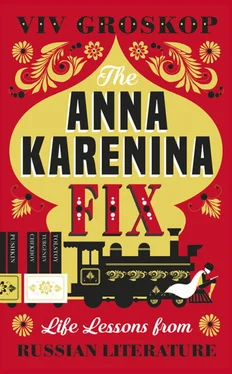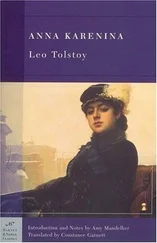Viv Groskop - The Anna Karenina Fix - Life Lessons from Russian Literature
Здесь есть возможность читать онлайн «Viv Groskop - The Anna Karenina Fix - Life Lessons from Russian Literature» весь текст электронной книги совершенно бесплатно (целиком полную версию без сокращений). В некоторых случаях можно слушать аудио, скачать через торрент в формате fb2 и присутствует краткое содержание. Город: London, Год выпуска: 2017, ISBN: 2017, Издательство: Fig Tree, Жанр: Публицистика, Критика, на английском языке. Описание произведения, (предисловие) а так же отзывы посетителей доступны на портале библиотеки ЛибКат.
- Название:The Anna Karenina Fix: Life Lessons from Russian Literature
- Автор:
- Издательство:Fig Tree
- Жанр:
- Год:2017
- Город:London
- ISBN:978-0-241-98126-9
- Рейтинг книги:3 / 5. Голосов: 1
-
Избранное:Добавить в избранное
- Отзывы:
-
Ваша оценка:
- 60
- 1
- 2
- 3
- 4
- 5
The Anna Karenina Fix: Life Lessons from Russian Literature: краткое содержание, описание и аннотация
Предлагаем к чтению аннотацию, описание, краткое содержание или предисловие (зависит от того, что написал сам автор книги «The Anna Karenina Fix: Life Lessons from Russian Literature»). Если вы не нашли необходимую информацию о книге — напишите в комментариях, мы постараемся отыскать её.
‘A passionate, hilarious, joyful love letter to Russian literature’ Allison Pearson, Sunday Telegraph
‘A delightful primer and companion to all the authors you are ashamed to admit you haven’t read’ The Times
The Anna Karenina Fix: Life Lessons from Russian Literature — читать онлайн бесплатно полную книгу (весь текст) целиком
Ниже представлен текст книги, разбитый по страницам. Система сохранения места последней прочитанной страницы, позволяет с удобством читать онлайн бесплатно книгу «The Anna Karenina Fix: Life Lessons from Russian Literature», без необходимости каждый раз заново искать на чём Вы остановились. Поставьте закладку, и сможете в любой момент перейти на страницу, на которой закончили чтение.
Интервал:
Закладка:
Anna Karenina regrets her suicide while she is in the very act. Just as she is pulled under the wheels, she says, horrified: ‘Where am I? What am I doing? Why?’ We get it. There’s not much point in her asking these questions now. She had her chance. She blew it. Tolstoy’s message? We need to make sure we ask these questions. But not quite so late.
In the end, Tolstoy appears to be asking something about literature itself. Is it really the job of novels to tell us how to live? Sadly, in his own life, he came to the conclusion that Anna Karenina had showed him how not to live: he did not want to be the person who wrote entertaining, complex novels. In coming to this realization, he failed to follow his own advice and, instead of being like other happy people, he became uniquely unhappy in his own fashion. The final message of Anna Karenina ? It’s all very well looking for answers, but life is, essentially, unknowable. We must search desperately for meaning. Sometimes we will come close to it, but most of the time we will be disappointed and then we will die. Sorry about that. Did I mention that not all the lessons would be cheery? Come on, this is Russian literature we’re talking about, after all.
2. How to Face Up to Whatever Life Throws at You: Doctor Zhivago by Boris Pasternak
(Or: Don’t leave your wife while she’s pregnant)
‘How wonderful to be alive, he thought. But why does it always hurt?’
The strange thing about learning a new language is that the more you learn, the more you start to pick up clues about the psychology of the people who speak the language. When I first went to Russia in 1992 and was starting to speak enough Russian to understand what people were saying to me, I was astonished to find that they genuinely spoke about ‘fate’ the whole time, like something out of a bad Bond film. It was so weird that, initially, I thought I was imagining it or misunderstanding the words. ‘Why? You ask why? No reason. It’s fate.’ ‘You are in Russia at an important historical moment. It is your fate.’ And often: ‘Drink it. It’s your fate, Vivka.’ Yes, I finally had a group of friends who had gifted me ‘Vivka’ (Little Viv) as my very own personal diminutive. My elderly landlady once misheard this as ‘Veepka’ (Little VIP, as the initials VIP are pronounced ‘veep’ in Russian) so I was also known as that: Vivka, Veep (VIP) or Vipulya (Tiny Little VIP) or Vipulenka (Dearest Teeny Tiny Little VIP). This was all extremely odd, as these names were used completely earnestly and not as a joke. I just got used to people shouting, across a room, ‘Dearest Teeny Tiny Little VIP, come over here!’
After a while, I even became unaware of this and thought it was normal. There is so much strangeness to the Russian language that you give up noticing it. Along with ‘fate’ and being called Dearest Teeny Tiny Little VIP, the concept of ‘soul’ came up constantly in everyday conversation. The answer to anything difficult to explain? ‘It is the Russian soul.’ The best kind of music, theatre or writing? ‘You can feel it in your soul.’ The highest compliment? ‘You have a Russian soul.’
People would genuinely say these things in conversation, in passing. And not just people who were a bit odd and ridiculously intense – although a lot of people I met during the early 1990s were both those things. Everyone. Fate and soul are big things for Russians. They feel them. They regard them as intensely real. I was initially sceptical about their existence. But then I realized how useful they are. ‘Soul’ is perhaps close to what we might call instinct. Ignore it at your peril. ‘Fate’ is what we call reality. It’s good to accept both.
The greatest expression in literature of these twin feelings is Pasternak’s epic novel Doctor Zhivago . Yury Zhivago has the most Russian of souls, and he does what he can to survive his fate. The novel opens with a funeral scene, as brief as it is depressing. Yuri’s mother is being buried. He is ten years old. As the coffin is lowered, the earth scattered and the grave filled, Yuri climbs up on to the mound, raises his head as if he is about to howl like a wolf, and bursts into tears. This is classic Pasternak. Set a scene, decorate it with certain picturesque elements and unleash the feelings. Whenever I think of Doctor Zhivago , I think of that funeral scene and of the only Russian funeral I attended. It was the experience I would return to in my memory whenever I thought about my relationship to Russia. I have never felt more foreign at any moment in my life, before or since.
The day I would first experience the Russian idea of ‘fate’ started ridiculously early, with a dull, distant banging on the door at 5.30 a.m. The sound reached me vaguely, as if I were under water. I was still fast asleep and dreaming strange, feverish dreams. A year after I had been christened Tiny Little VIP during the summer of my first trip to Russia, I returned to St Petersburg for my university year abroad, to teach English and, hopefully, become fluent in Russian. Before leaving, I had watched The Shining . This was a terrible mistake. First, I hate horror films and find myself very easily haunted by them in the best of circumstances. Second, the hostel where I was staying, in north-west St Petersburg, looked very much like the guesthouse featured in the film, with its long, poorly lit corridors and flickering overhead lighting. If you were going to kill someone, cover your traces, then write ‘Red Rum’ on a mirror in Cyrillic, this would have been an extremely good place to do it. I was full of apprehension, anxiety and a sort of terrified awe about living in a place that felt more like a 1970s information film about Communism than a real place. I had sweaty dreams where Jack Nicholson shouted at me in Russian.
The atmosphere was already psychologically charged. So it did not help that no one in charge of our group of a dozen fresh-faced would-be teachers of English seemed to have any idea what was going on. We were told that we would soon be meeting with ‘a Methodist’. We had visions of Bibles and prayer books. Our group leader said she had no idea why things suddenly seemed to have taken on a religious dimension, but she didn’t like to ask too many questions. It later turned out that the Russian word ‘methodist’ simply means someone who trains you in teaching methods; it has nothing to do with the Methodist faith of John Wesley. As we awaited further instruction, I navigated the mostly empty local shops, acquiring menthol cigarettes, vast quantities of toilet paper (anticipating a shortage, as it seemed the only thing to be freely available) and a rather beautiful Soviet hand-stitched bra for a very small amount of roubles. Meanwhile, a friend died. Not a close friend. But a friend, nonetheless.
That early-morning knock at the door was not unexpected. Several days earlier, the news had reached me that a young Russian woman I knew had killed herself. She would have been eighteen or nineteen. I was twenty at the time. Masha was not someone I knew intimately, but I considered her a friend and I was fond of her. Out of our group just arrived from the UK, I was one of the few who already had friends in St Petersburg, people I knew from three visits to the city over the previous year. I had first visited Russia the year before, in a last-ditch attempt to understand Russian, having almost failed my exams at the end of my first year at university.
Life was extraordinarily hard for the young Russians I befriended in the early 1990s. And it wasn’t easy for them to have me as their friend. I represented something exotic and exciting. For some people, I was, potentially, a source of money or treats or – what everyone really wanted – jeans, ideally Levi’s. I once had an awful conversation with one of my students when I was teaching English, when he asked me what I was getting my (Ukrainian) boyfriend for Christmas: ‘Jeans,’ I replied, without thinking. There was an inevitable pause while we both considered the fact that I probably shouldn’t have admitted to this. He shot back meaningfully: ‘I could also do with some jeans.’ Awkward. I knew that the relationship I had with some of these friends was artificially intimate because of my status as a foreigner. But we liked each other and had some good times together. Still, it was a strange and unbalanced relationship. One thing I was ill equipped for in this context, both linguistically and emotionally, was a death, especially the suicide of someone my own age.
Читать дальшеИнтервал:
Закладка:
Похожие книги на «The Anna Karenina Fix: Life Lessons from Russian Literature»
Представляем Вашему вниманию похожие книги на «The Anna Karenina Fix: Life Lessons from Russian Literature» списком для выбора. Мы отобрали схожую по названию и смыслу литературу в надежде предоставить читателям больше вариантов отыскать новые, интересные, ещё непрочитанные произведения.
Обсуждение, отзывы о книге «The Anna Karenina Fix: Life Lessons from Russian Literature» и просто собственные мнения читателей. Оставьте ваши комментарии, напишите, что Вы думаете о произведении, его смысле или главных героях. Укажите что конкретно понравилось, а что нет, и почему Вы так считаете.












